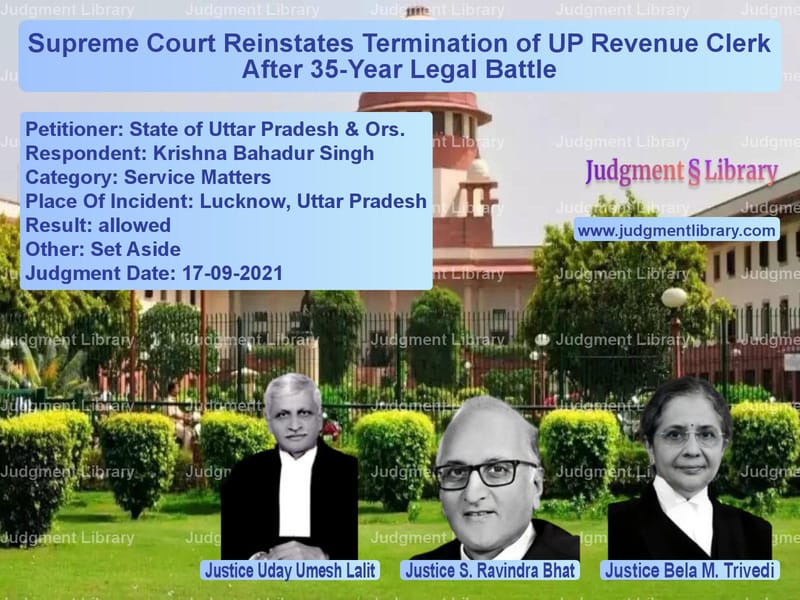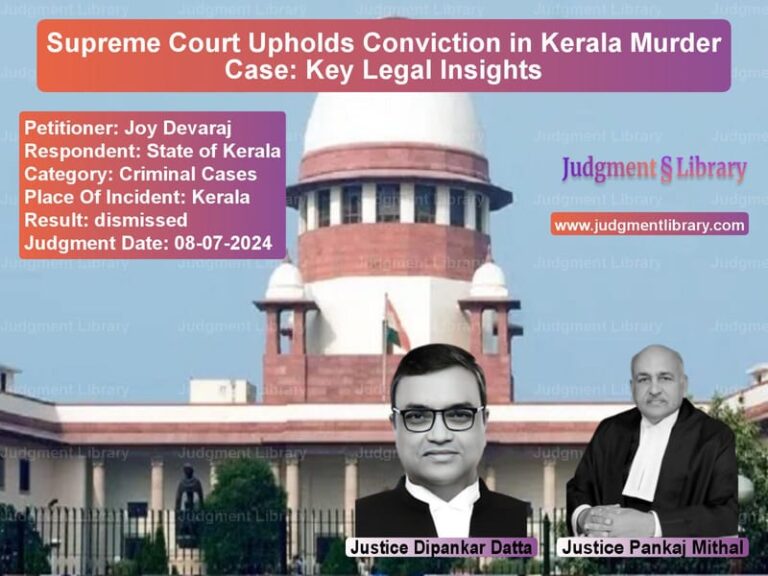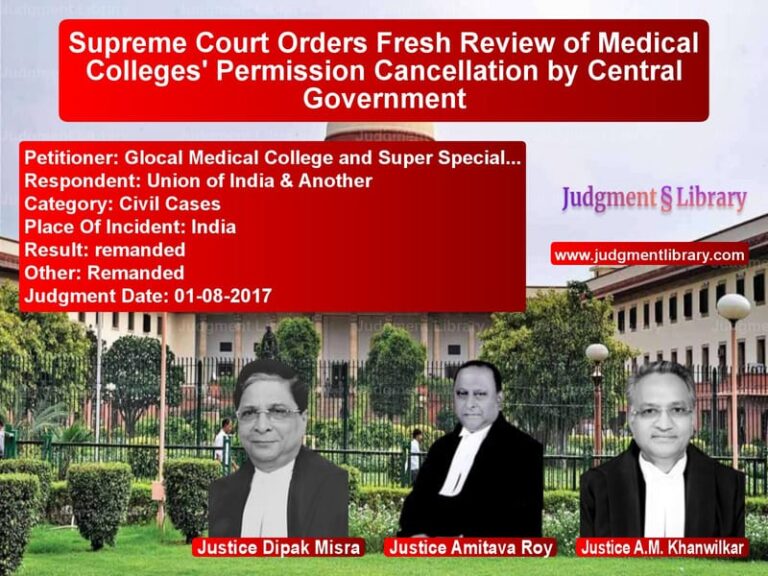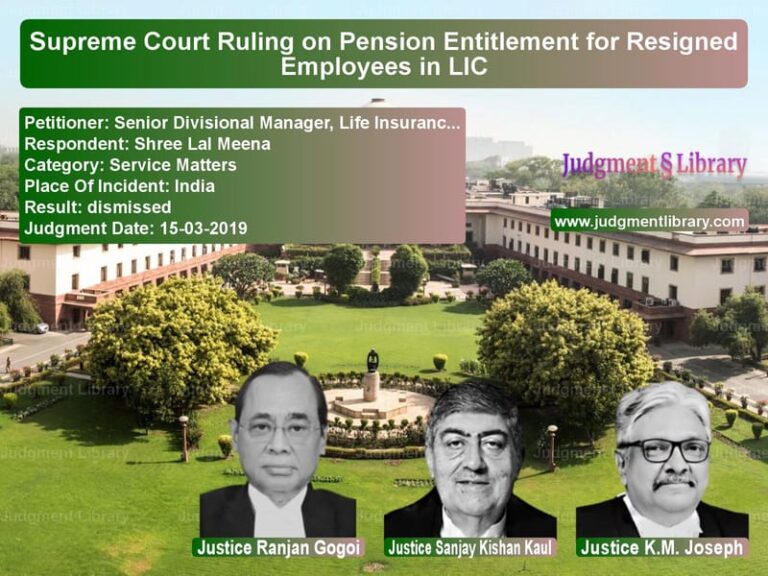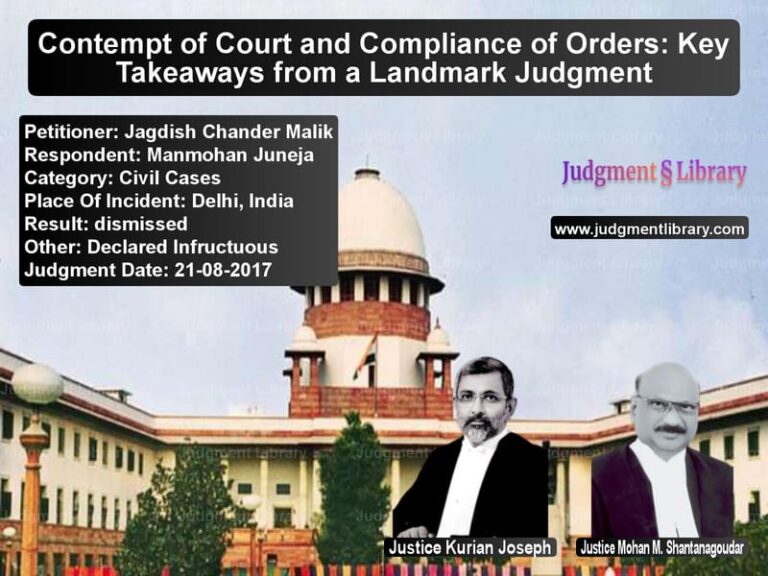Supreme Court Reinstates Termination of UP Revenue Clerk After 35-Year Legal Battle
The case of State of Uttar Pradesh & Ors. v. Krishna Bahadur Singh revolved around the dismissal of a Lower Division Clerk from the Uttar Pradesh Revenue Department on charges of misappropriation of government funds. The Supreme Court was tasked with determining whether the long-delayed legal challenge by the respondent should be entertained and whether the Tribunal and High Court erred in overturning his termination.
Background of the Case
The respondent, Krishna Bahadur Singh, was employed as a Lower Division Clerk in the Revenue Department of the Uttar Pradesh government. On October 4, 1986, he was suspended, and departmental proceedings were initiated against him over allegations of misappropriation of government funds. Initially, he participated in the inquiry but later chose to remain ex parte.
After the inquiry was concluded, he was dismissed from service on June 13, 1988. His appeal before the Commissioner of Lucknow was rejected on July 29, 1988, and his subsequent revision was dismissed by the Board of Revenue. Despite these dismissals, he did not challenge the decision until 1999, when he filed a claim petition before the Uttar Pradesh Public Service Tribunal, nearly 11 years after his termination.
During the intervening period, criminal proceedings were initiated against him on the same charges. However, he was acquitted due to the benefit of doubt. In 2013, the Tribunal ruled in his favor and set aside his termination order. The State of Uttar Pradesh challenged this ruling before the High Court, but the Division Bench of the Allahabad High Court, Lucknow Bench, upheld the Tribunal’s decision in 2017. This led to the appeal before the Supreme Court.
Key Issues Before the Supreme Court
- Whether the respondent’s delay of 11 years in challenging his termination should have been entertained.
- Whether his acquittal in the criminal case impacted the disciplinary proceedings.
- Whether the Tribunal and High Court erred in overturning his termination.
- Whether the Supreme Court should grant relief despite procedural lapses.
Arguments by the Appellants (State of Uttar Pradesh)
The Uttar Pradesh government contended that:
- The respondent’s claim should have been dismissed outright due to an 11-year delay in filing the challenge.
- Acquittal in a criminal trial does not automatically invalidate disciplinary proceedings.
- The respondent had participated in the inquiry but later chose to remain ex parte, indicating that he had exhausted his legal avenues at the time.
- The High Court and Tribunal erred in reinstating him without considering the significant passage of time.
Arguments by the Respondent (Krishna Bahadur Singh)
The respondent argued that:
- His acquittal in the criminal case negated the basis of his dismissal, making the termination order unsustainable.
- The 11-year delay in filing the claim petition was due to financial hardship and legal uncertainty.
- The Tribunal correctly reinstated him as the inquiry was conducted unfairly.
- The High Court was right in upholding the Tribunal’s decision, as it ensured justice for an unfairly dismissed employee.
Supreme Court’s Analysis
The Supreme Court, comprising Justices Uday Umesh Lalit, S. Ravindra Bhat, and Bela M. Trivedi, analyzed the merits of the case, particularly the long delay and its implications for service jurisprudence.
Key Findings
- Delay in Filing Was Unjustified: The Court emphasized that a delay of 11 years in challenging a dismissal should not have been entertained by the Tribunal.
- Acquittal in Criminal Proceedings Did Not Impact Disciplinary Action: The Court reiterated that service law follows the principle of “preponderance of probability,” whereas criminal cases require proof “beyond a reasonable doubt.” Therefore, his acquittal did not negate the findings of the departmental inquiry.
- High Court and Tribunal Erred in Reinstating the Employee: The Supreme Court ruled that both lower forums failed to consider the significance of the delay and wrongly overturned a lawful dismissal.
Key Observations by the Supreme Court
“The challenge raised at his instance was 11 years after the initial order, on which ground alone, the challenge should have been dismissed.”
“Acquittal in a criminal case does not automatically entitle an employee to reinstatement, especially when independent departmental proceedings have found him guilty.”
Final Judgment
The Supreme Court ruled:
- The orders of the Tribunal and the High Court were set aside.
- The claim petition filed by the respondent was dismissed.
- Given the prolonged litigation and his legal battle, the Supreme Court directed the State of Uttar Pradesh to pay an ex gratia amount of ₹1,00,000 to the respondent.
- The amount was to be paid within six weeks from the date of the judgment.
Implications of the Judgment
This ruling has significant implications:
- Reinforces the Importance of Timeliness in Service Matters: The judgment sets a precedent that long-delayed challenges to service dismissals should not be entertained.
- Clarifies the Impact of Criminal Acquittals on Disciplinary Proceedings: It upholds the principle that acquittal does not nullify an adverse finding in a departmental inquiry.
- Limits Judicial Interference in Service Decisions: The ruling restricts lower courts from reinstating dismissed employees without considering procedural and factual aspects.
Conclusion
The Supreme Court’s decision in State of Uttar Pradesh v. Krishna Bahadur Singh reinforces the importance of procedural discipline in service law. By rejecting an 11-year delayed claim, the ruling affirms that courts must not encourage belated challenges to disciplinary actions. While the Court showed compassion by granting an ex gratia payment, it firmly upheld the principle that justice delayed should not mean justice denied to the State.
Petitioner Name: State of Uttar Pradesh & Ors..Respondent Name: Krishna Bahadur Singh.Judgment By: Justice Uday Umesh Lalit, Justice S. Ravindra Bhat, Justice Bela M. Trivedi.Place Of Incident: Lucknow, Uttar Pradesh.Judgment Date: 17-09-2021.
Don’t miss out on the full details! Download the complete judgment in PDF format below and gain valuable insights instantly!
Download Judgment: state-of-uttar-prade-vs-krishna-bahadur-sing-supreme-court-of-india-judgment-dated-17-09-2021.pdf
Directly Download Judgment: Directly download this Judgment
See all petitions in Disciplinary Proceedings
See all petitions in Public Sector Employees
See all petitions in Termination Cases
See all petitions in Judgment by Uday Umesh Lalit
See all petitions in Judgment by S Ravindra Bhat
See all petitions in Judgment by Bela M. Trivedi
See all petitions in allowed
See all petitions in Set Aside
See all petitions in supreme court of India judgments September 2021
See all petitions in 2021 judgments
See all posts in Service Matters Category
See all allowed petitions in Service Matters Category
See all Dismissed petitions in Service Matters Category
See all partially allowed petitions in Service Matters Category

